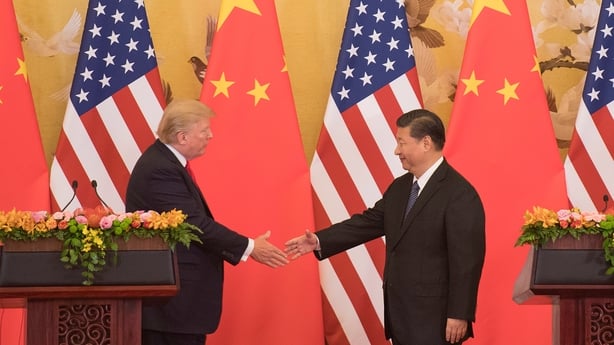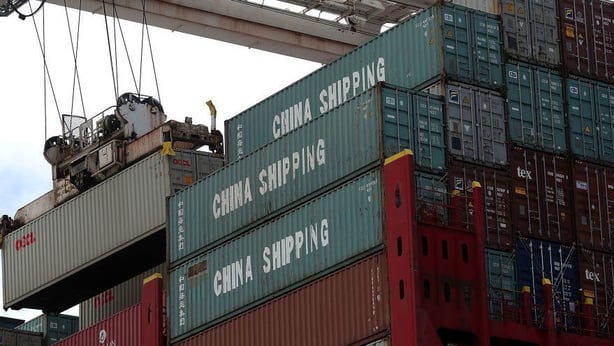"I think Zelensky is one of the greatest salesmen I've ever seen. Every time he comes in, we give him $100 billion," Donald Trump said on a conservative podcast last October.
"I feel very badly for those people. But he should never have let that war start. That war is a loser," he went on to tell podcast host Patrick Bet-David.
The war was of course started by a Russian invasion of Ukraine.
Comments like these prompted many experts to predict that Mr Trump's election in November would spell disaster for Ukraine.
However, as Donald Trump prepares to take office, we're still not sure what his policy on the Ukrainian conflict will be.
During his last term, Mr Trump moved the US Embassy in Israel to Jerusalem, a move that was widely disparaged and again many predict that his second term will lead to more instability in the Middle East.
Yet the Israelis at least are saying that this week's ceasefire might never have happened were it not for Mr Trump's ultimatum for peace before his inauguration.
Then there are the campaign promises of widespread tariffs against China, the EU and Canada, which experts say will be an economic disaster, yet markets have been booming ever since the early election results favoured Mr Trump on the evening of 5 November.
The world is expecting turmoil, but how much of Donald Trump's bluster is just hot air and what concrete steps could he take to influence world affairs?
'Unconstrained'
Matthew Dowd, NBC political commentator and former chief strategist for US President George Bush, told RTÉ News that while Mr Trump damaged the US's international reputation in his first term, he didn't really do any substantive damage to international relations.
"I think was very limited, but that's because he had people around him that would regulate him, but this time he's unconstrained," he said.

Mr Trump's cabinet picks, which are virtually all certain to be confirmed by the Senate because of the Republican majority, are essentially all 'yes' men and women, who have all indicated loyalty to his MAGA politics over traditional conservative policies.
"They come from different backgrounds in different places, but they all seem to have the same inclination to bend the knee to Donald," said Mr Dowd.
However, the incoming president is also unconstrained by the fact that he won't be seeking re-election this time.
There's no political jeopardy and Mr Dowd says Mr Trump doesn't care about his legacy in the world, that he'll be looking to do deals that will benefit him personally.
"I don't think he has a real geopolitical viewpoint. I think it's all transactional," he said.
"The most concerning thing to me, is in a world that has become so dependent on interconnection, he doesn't desire connection. He basically says, even though that's the world as is, I don't want that world as is," Mr Dowd said.
Middle East
Mr Trump's presidency is starting with a huge win, with the ceasefire in Gaza coming, as he demanded, just before he takes office.
Despite months of negotiations, Mr Trump will likely get the credit much the way President Reagan got the credit for the release of US hostages in the Iran crisis, despite the deal being reached under the Carter administration.
The Israeli deputy foreign minister did say this week that Mr Trump's ultimatum to reach a deal before his inauguration was key in pushing the deal forward.
It is not known if any promises were made to Israel, but Mr Dowd says that Israeli Prime Minister Benjamin Netanyahu understands that under a Trump presidency he is unlikely to get any resistance from the US were the war to resume.
Ukraine
As for Ukraine, Mr Dowd says that Mr Trump wouldn't be able to continue to fund President Zelensky's war effort even if he wanted to.
"I don't see the Republican Congress giving much more, if any, more money, so I think the question becomes whether Europe can lead that aid," he said.

Mr Dowd could see Donald Trump doing a deal with President Putin and trying to force President Zelensky to accept it, and that then it really depends on whether Europe is willing or able to fund the war effort.
Overall, Mr Trump's America First policy could see the US taking more of a back seat on many global issues and creating a void that others will be forced to fill.
"Where the post war, World War II alliances were mostly led by the United States, we could be entering a new era where international alliances are led by other centres of power, and I actually don't think that would be a bad thing, if others stepped up," Mr Dowd added.
Tariffs
The imposition of trade tariffs could arguably be Mr Trump's most consequential foreign policy decision, in that it could affect the pockets of Americans and billions of people around the world.
"I think he's definitely going to impose some tariffs," says Mr Dowd.
"How broad and deep they are, I don't know."
He feels he will impose tariffs on some countries, most likely China, so that he can get a public reaction and look strong to his MAGA supporters, but that he will stop short of placing widespread tariffs on the EU and other allies, that would really hurt the US economy.
We need your consent to load this rte-player contentWe use rte-player to manage extra content that can set cookies on your device and collect data about your activity. Please review their details and accept them to load the content.Manage Preferences
China
Despite his sabre-rattling over tariffs, Donald Trump has sent an olive branch to China by inviting Chinese President Xi Jinping to his inauguration.
Mr Xi will not attend but is sending his vice president.
Mr Dowd says that like his relationship with Mr Putin and Mr Netanyahu, Donald Trump thinks he can influence President Xi with charm in face-to-face meetings.
"Like everything, he views it through his personal experience. He constantly overestimates his personal ability to influence."
Executive orders
Though some of what Mr Trump has said is likely bluster, foreign policy is one area where he may be able to achieve some of his promises.
Despite having a majority in the House and the Senate, Mr Dowd says Mr Trump will struggle to pass meaningful legislation.
"He's got a three vote margin in the House and there's enough members that are worried about re-election and then he's got two or three senators in the Senate that are not guaranteed to support him," he said.
This is why Trump promised a wave of executive presidential orders on day one.
He can impose tariffs or make major foreign policy decisions without consulting Congress.
"That's what I would be most worried about because he's not going to be able to have free rein in the Congress", added Mr Dowd. "So where can he have free rein? Internationally."
In short, we can expect fireworks, starting with the signing of multiple executive orders, likely in the Oval Office on day one, right after the inauguration.







